President Donald Trump hailed it as a great day for civilization, but the agreement hammered out Thursday in Ankara between U.S. and Turkish leaders spawned more questions than answers.
The deal calls for a five-day pause in fighting between Turkish and Kurdish fighters and puts at least a temporary halt to the battle along the Syrian border. It also gives the Turks the 20-mile-deep safe zone in Syria that leaders in Ankara have sought for months. But what it means for U.S. forces currently withdrawing from Syria remained unclear.
A look at the key provisions of the deal and remaining uncertainties:
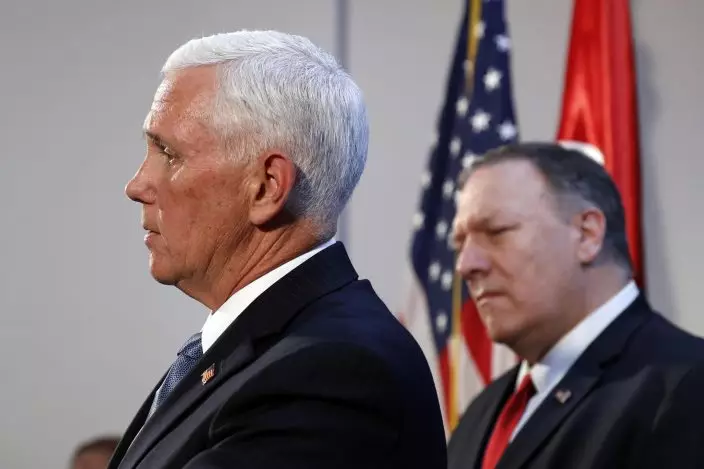
Vice President Mike Pence speaks at the U.S. ambassador's residence during a news conference with Secretary of State Mike Pompeo after their meeting with Turkish President Recep Tayyip Erdogan, Thursday, Oct. 17, 2019, in Ankara, Turkey. Pence says the U.S. and Turkey have agreed to a cease-fire in Syria. (AP PhotoJacquelyn Martin)
THE AGREEMENT
A U.S. delegation led by Vice President Mike Pence met with Turkish leaders, including President Recep Tayyip Erdogan, for more than four hours Thursday and agreed to the five-day cease-fire in the Turkish assault on Kurdish fighters in northern Syria. The arrangement says the Syrian Kurdish fighters will withdraw out of what has been called a safe zone that is about 20-miles deep into Syria and stretches across about 125 kilometers (78 miles) of the central portion of the border between the two countries.
But almost immediately there were disagreements over what to call the deal and what it meant. Pence and Trump routinely referred to it as a cease-fire. Turkish Foreign Minister Mevlut Cavusoglu rejected that term and called it a "pause" in fighting, because he said cease-fires are only possible between "two legitimate sides." Cavusoglu also said that the Turks would only halt their operation "after the terrorist elements depart" from northeast Syria.
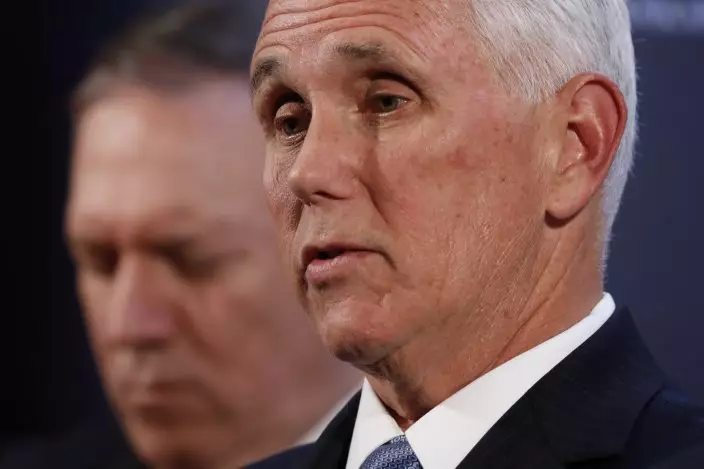
Vice President Mike Pence speaks at the U.S. ambassador's residence during a news conference with Secretary of State Mike Pompeo after their meeting with Turkish President Recep Tayyip Erdogan, Thursday, Oct. 17, 2019, in Ankara, Turkey. Pence says the U.S. and Turkey have agreed to a cease-fire in Syria. (AP PhotoJacquelyn Martin)
What also remained unclear is what the Turkish-backed militias of Syrian fighters will do and how much control the Turkish military will have or try to exert over them.
WHAT THE TURKS GET
In return for the cease-fire, the Turks will get what they have wanted all along: control of the safe zone in Syria and, if the cease-fire holds, a halt to the economic sanctions that Trump announced Monday when he warned that he could obliterate Turkey's economy.
THE U.S. WITHDRAWAL
There were mixed signals Thursday over what the agreement means for U.S. forces that began a withdrawal from Syria earlier this week as fighting between the Turkish and Kurdish forces escalated and began to threaten the safety of American troops. U.S. officials said the ongoing withdrawal was continuing and would probably take a couple of weeks.
Pence reiterated that, as Trump has said, the U.S. will not have "military personnel on the ground," but other diplomatic and humanitarian aid would go on. He also said that the U.S. will "facilitate" the orderly withdrawal of the Kurdish forces from the safe zone that is already beginning. And Trump said the U.S. will continue to watch the Islamic State, and that the Kurdish fighters will control that monitoring with U.S. supervision. Pentagon officials did not provide an explanation of how that would work.
ISLAMIC STATE GROUP
As the U.S. withdraws, a fundamental question is what the battle to prevent a re-emergence of the Islamic State will look like. U.S. officials have provided little guidance, but they note that the U.S. can, if needed, launch strikes from bases in Iraq near the Syria border. In addition, the U.S. is leaving, at least for now, 200 to 300 troops at the Al Tanf base in southern Syria.
ISLAMIC STATE PRISONERS
One of the biggest threats in the conflict has been the potential that thousands of imprisoned IS fighters could escape. Kurdish forces have been guarding the prisons, but some fighters have left to join the battle along the border. And shelling in some areas may have led to the escape of fewer than 100 detainees.
Trump said that the detained will be controlled by "different groups." But he added that the U.S. "will be watching. We will be in charge. And they will be under very, very powerful and strict control." That may be hard to do if U.S. troops are not physically in Syria.
UNITED NATIONS (AP) — The United States vetoed a widely backed U.N. resolution Thursday that would have paved the way for full United Nations membership for Palestine, a goal the Palestinians have long sought and Israel has worked to prevent.
The vote in the 15-member Security Council was 12 in favor, the United States opposed and two abstentions, from the United Kingdom and Switzerland. U.S. allies France, Japan and South Korea supported the resolution.
The strong support the Palestinians received reflects not only the growing number of countries recognizing their statehood but almost certainly the global support for Palestinians facing a humanitarian crisis caused by the war in Gaza, now in its seventh month.
The resolution would have recommended that the 193-member U.N. General Assembly, where there are no vetoes, approve Palestine becoming the 194th member of the United Nations. Some 140 countries have already recognized Palestine, so its admission would have been approved, likely by a much higher number of countries.
U.S. deputy ambassador Robert Wood told the Security Council that the veto “does not reflect opposition to Palestinian statehood but instead is an acknowledgment that it will only come from direct negotiations between the parties."
The United States has “been very clear consistently that premature actions in New York — even with the best intentions — will not achieve statehood for the Palestinian people,” deputy State Department spokesman Vedant Patel said.
His voice breaking at times, Palestinian U.N. Ambassador Riyad Mansour told the council after the vote: “The fact that this resolution did not pass will not break our will and it will not defeat our determination.”
“We will not stop in our effort,” he said. “The state of Palestine is inevitable. It is real. Perhaps they see it as far away, but we see it as near.”
This is the second Palestinian attempt for full membership and comes as the war in Gaza has put the more than 75-year-old Israeli-Palestinian conflict at center stage.
Palestinian President Mahmoud Abbas first delivered the Palestinian Authority’s application for U.N. membership in 2011. It failed because the Palestinians didn’t get the required minimum support of nine of the Security Council’s 15 members.
They went to the General Assembly and succeeded by more than a two-thirds majority in having their status raised from a U.N. observer to a non-member observer state in 2012. That opened the door for the Palestinian territories to join U.N. and other international organizations, including the International Criminal Court.
Algerian U.N. Ambassador Amar Bendjama, the Arab representative on the council who introduced the resolution, called Palestine’s admission “a critical step toward rectifying a longstanding injustice" and said that “peace will come from Palestine’s inclusion, not from its exclusion.”
In explaining the U.S. veto, Wood said there are “unresolved questions” on whether Palestine meets the criteria to be considered a state. He pointed to Hamas still exerting power and influence in the Gaza Strip, which is a key part of the state envisioned by the Palestinians.
Wood stressed that the U.S. commitment to a two-state solution, where Israel and Palestine live side-by-side in peace, is the only path for security for both sides and for Israel to establish relations with all its Arab neighbors, including Saudi Arabia.
“The United States is committed to intensifying its engagement with the Palestinians and the rest of the region, not only to address the current crisis in Gaza, but to advance a political settlement that will create a path to Palestinian statehood and membership in the United Nations,” he said.
Mansour, the Palestinian U.N. ambassador, reiterated the commitment to a two-state solution but asserted that Israel believes Palestine "is a permanent strategic threat."
"Israel will do its best to block the sovereignty of a Palestinian state and to make sure that the Palestinian people are exiled away from their homeland or remain under its occupation forever,” he said.
He demanded of the council and diplomats crowded in the chamber: “What will the international community do? What will you do?”
Israeli-Palestinian negotiations have been stalled for years, and Israel’s right-wing government is dominated by hard-liners who oppose Palestinian statehood.
Israeli U.N. Ambassador Gilad Erdan called the resolution “disconnected to the reality on the ground” and warned that it “will cause only destruction for years to come and harm any chance for future dialogue.”
Six months after the Oct. 7 attack by the Hamas militant group, which controlled Gaza, and the killing of 1,200 people in “the most brutal massacre of Jews since the Holocaust,” he accused the Security Council of seeking “to reward the perpetrators of these atrocities with statehood.”
Israel’s military offensive in response has killed over 32,000 Palestinians, according to Gaza’s health ministry, and destroyed much of the territory, which speaker after speaker denounced Thursday.
After the vote, Erdan thanked the United States and particularly President Joe Biden “for standing up for truth and morality in the face of hypocrisy and politics.”
He called the Palestinian Authority — which controls the West Bank and the U.S. wants to see take over Gaza where Hamas still has sway — “a terror supporting entity.”
The Israeli U.N. ambassador referred to the requirements for U.N. membership – accepting the obligations in the U.N. Charter and being a “peace-loving” state.
“How can you say seriously that the Palestinians are peace loving? How?” Erdan asked. “The Palestinians are paying terrorists, paying them to slaughter us. None of their leaders condemns terrorism, nor the Oct. 7 massacre. They call Hamas their brothers.”
Despite the Palestinian failure to meet the criteria for U.N. membership, Erdan said most council members supported it.
“It’s very sad because your vote will only embolden Palestinian rejectionism every more and make peace almost impossible,” he said.
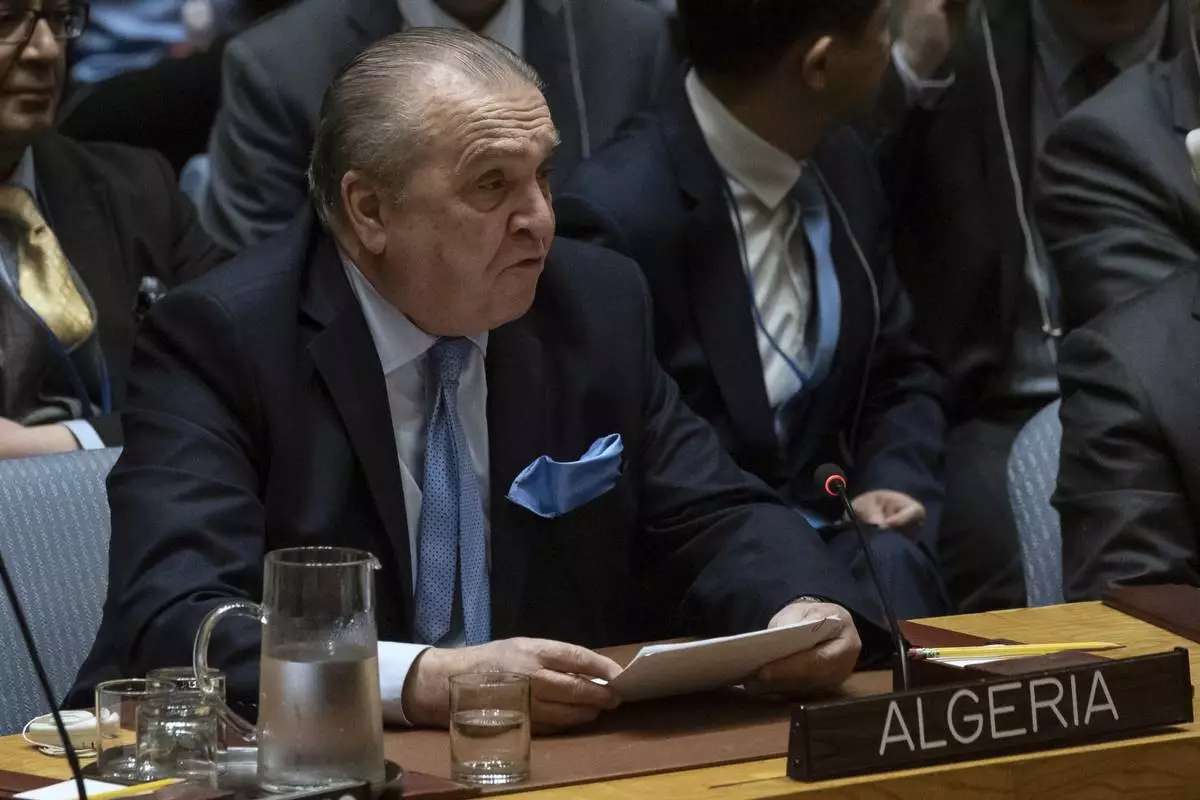
Algeria's Permanent Ambassador to the United Nations Amar Bendjama speaks during a Security Council meeting at United Nations headquarters, Thursday, April 18, 2024. (AP Photo/Yuki Iwamura)
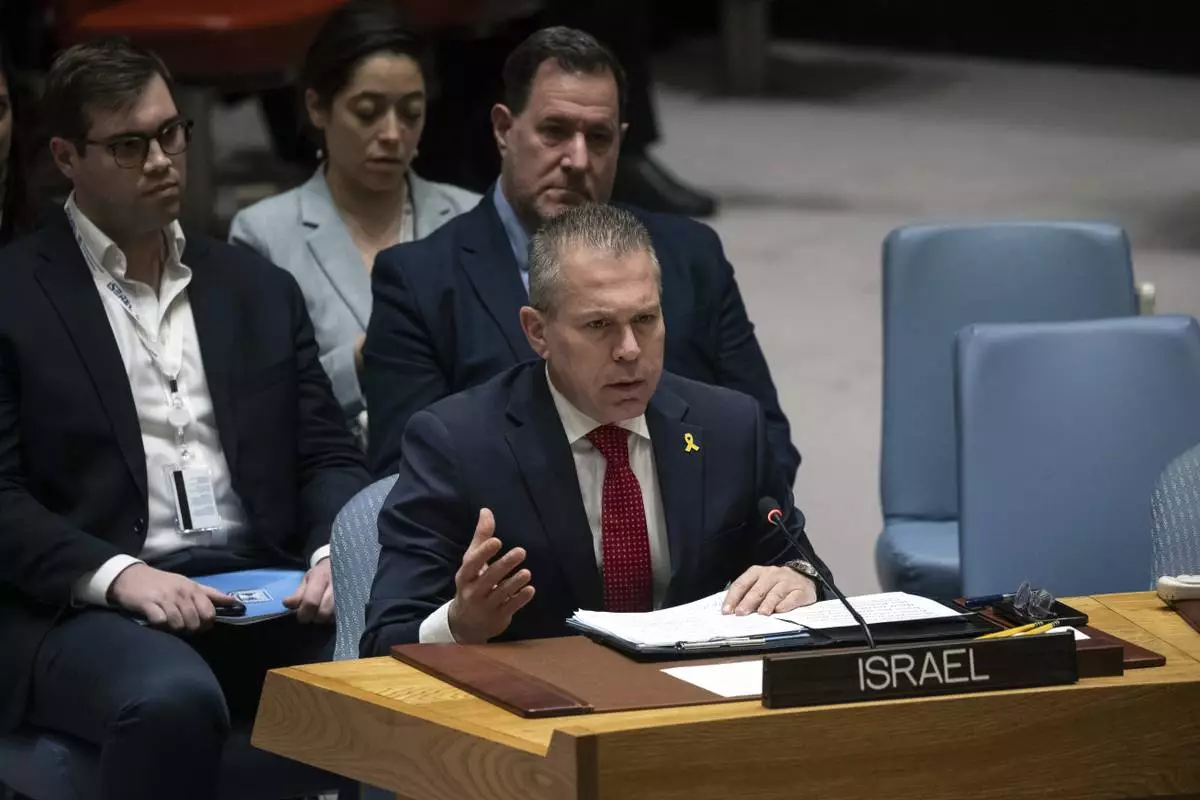
Israeli Ambassador to the United Nations Gilad Erdan speaks during a Security Council meeting at United Nations headquarters, Thursday, April 18, 2024. (AP Photo/Yuki Iwamura)
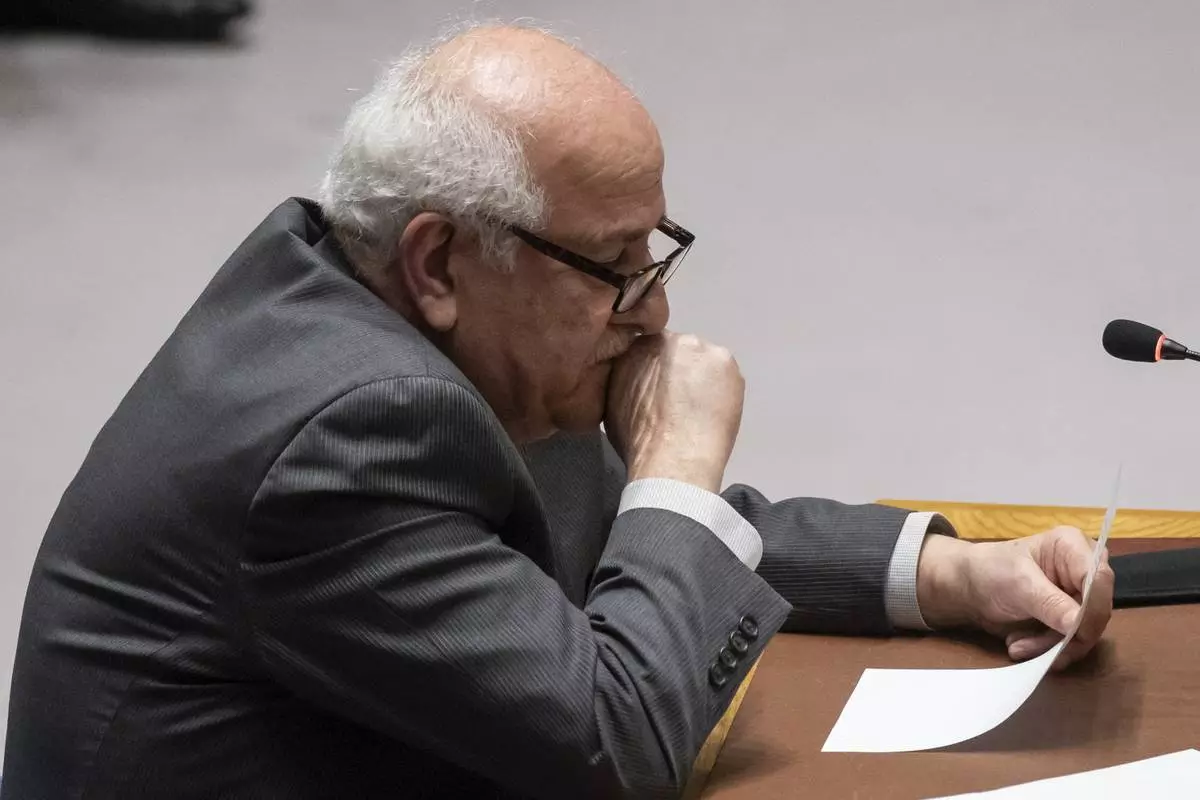
Palestinian Ambassador to the United Nations Riyad Mansour holds tears while speaking during a Security Council meeting at United Nations headquarters, Thursday, April 18, 2024. (AP Photo/Yuki Iwamura)
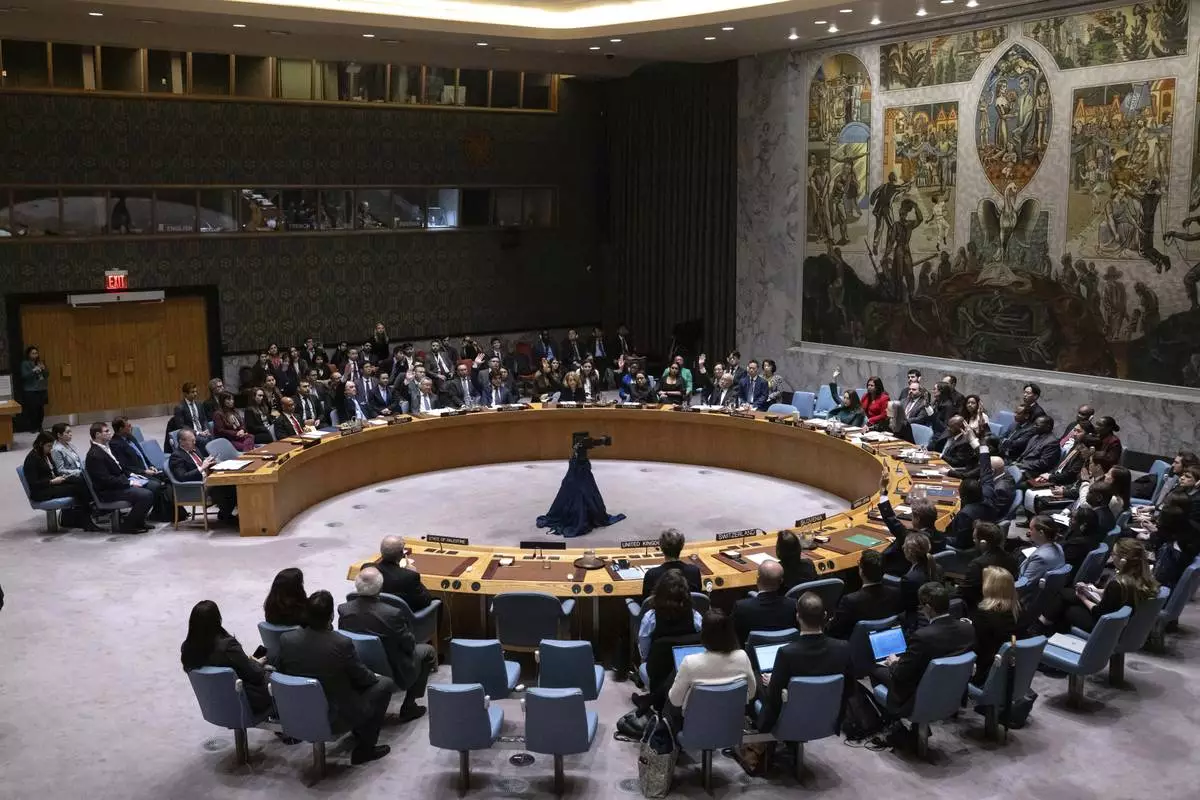
Representatives of member countries take votes during a Security Council meeting at United Nations headquarters, Thursday, April 18, 2024. (AP Photo/Yuki Iwamura)
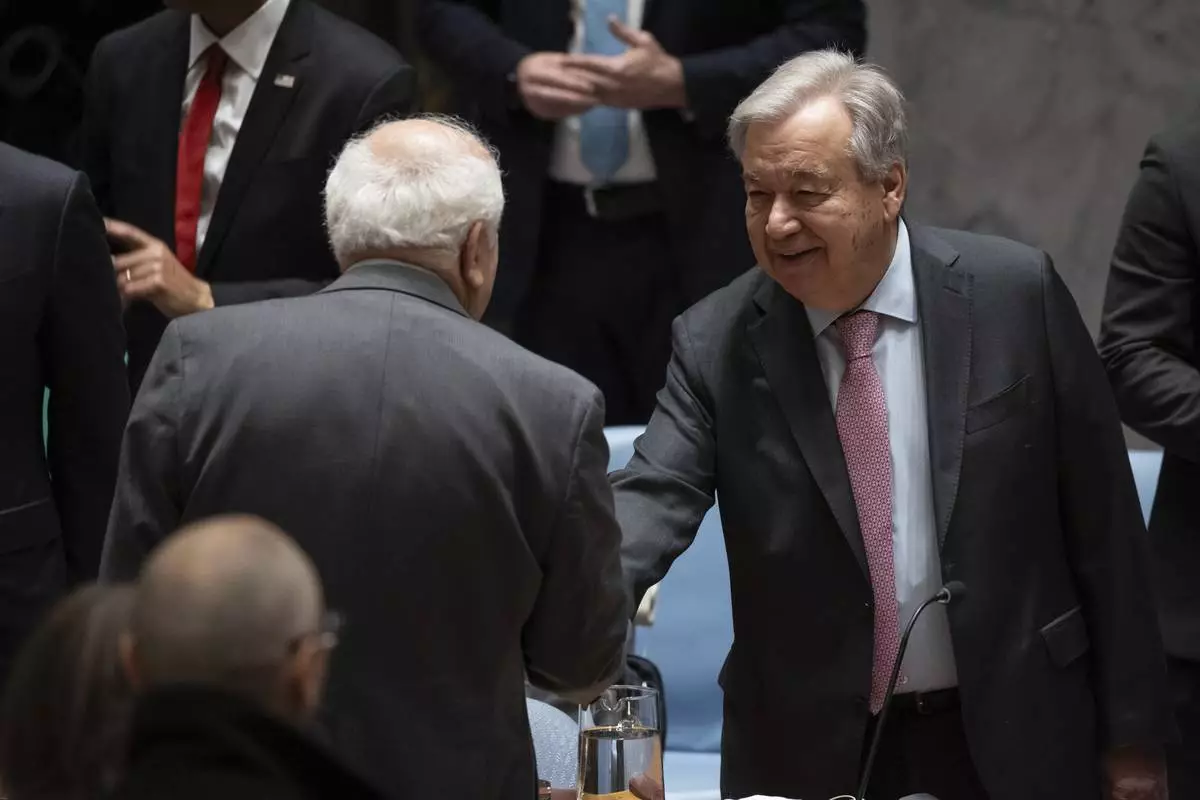
Palestinian Ambassador to the United Nations Riyad Mansour, left, and United Nations Secretary-General Antonio Guterres speak before a Security Council meeting at the United Nations headquarters, Thursday, April 18, 2024. (AP Photo/Yuki Iwamura)
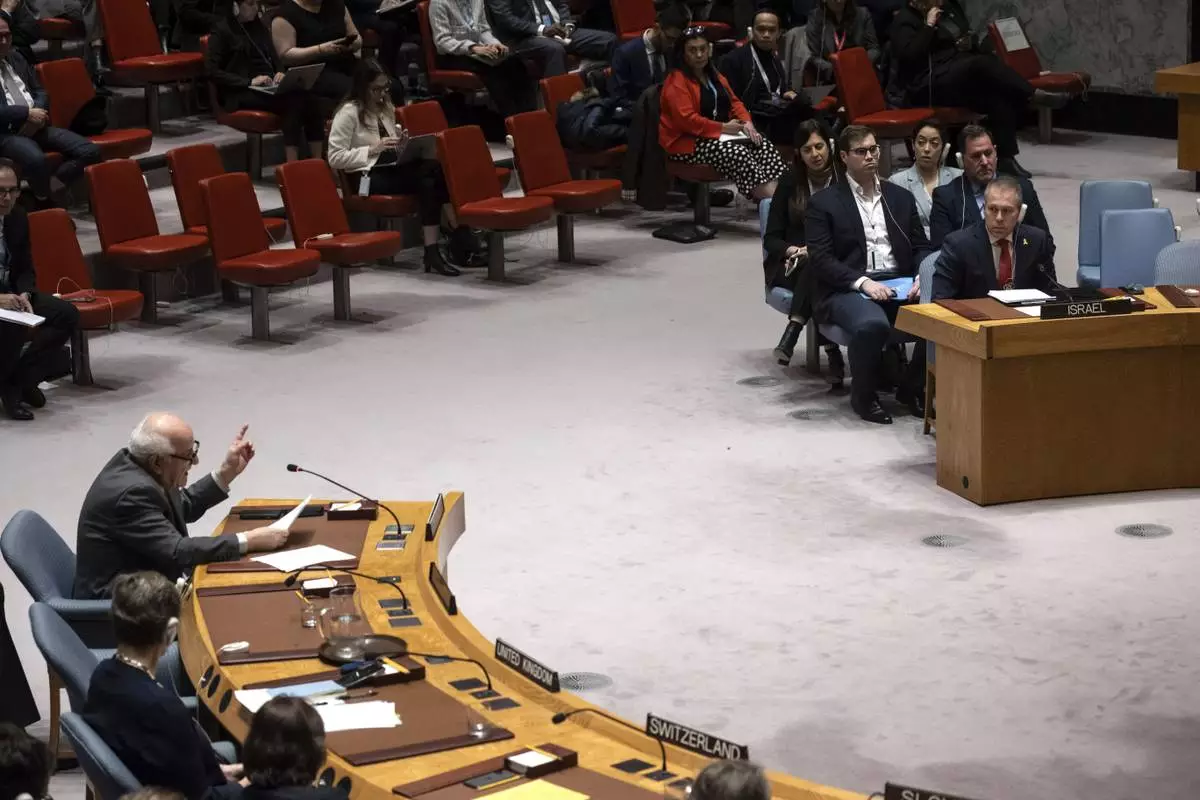
Palestinian Ambassador to the United Nations Riyad Mansour speaks during a Security Council meeting at United Nations headquarters, Thursday, April 18, 2024. (AP Photo/Yuki Iwamura)
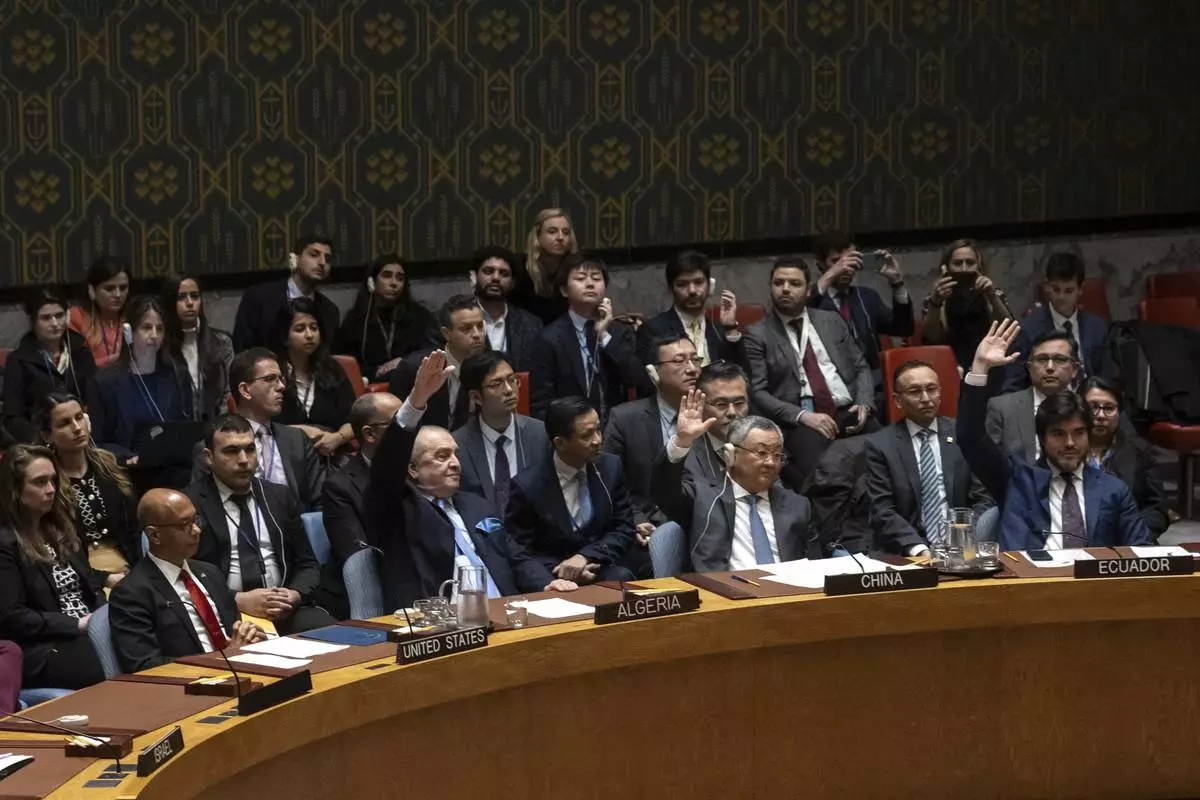
Representatives of member countries take votes during a Security Council meeting at United Nations headquarters, Thursday, April 18, 2024. (AP Photo/Yuki Iwamura)
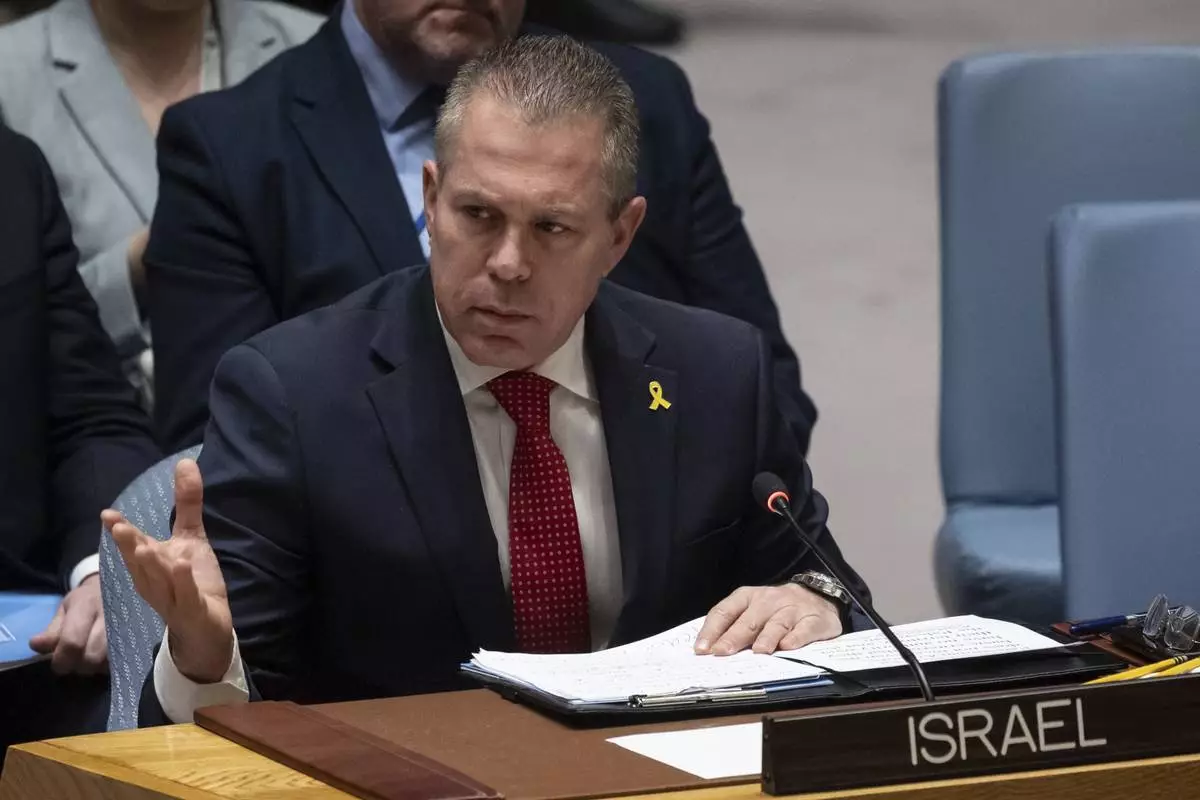
Israeli Ambassador to the United Nations Gilad Erdan speaks during a Security Council meeting at United Nations headquarters, Thursday, April 18, 2024. (AP Photo/Yuki Iwamura)
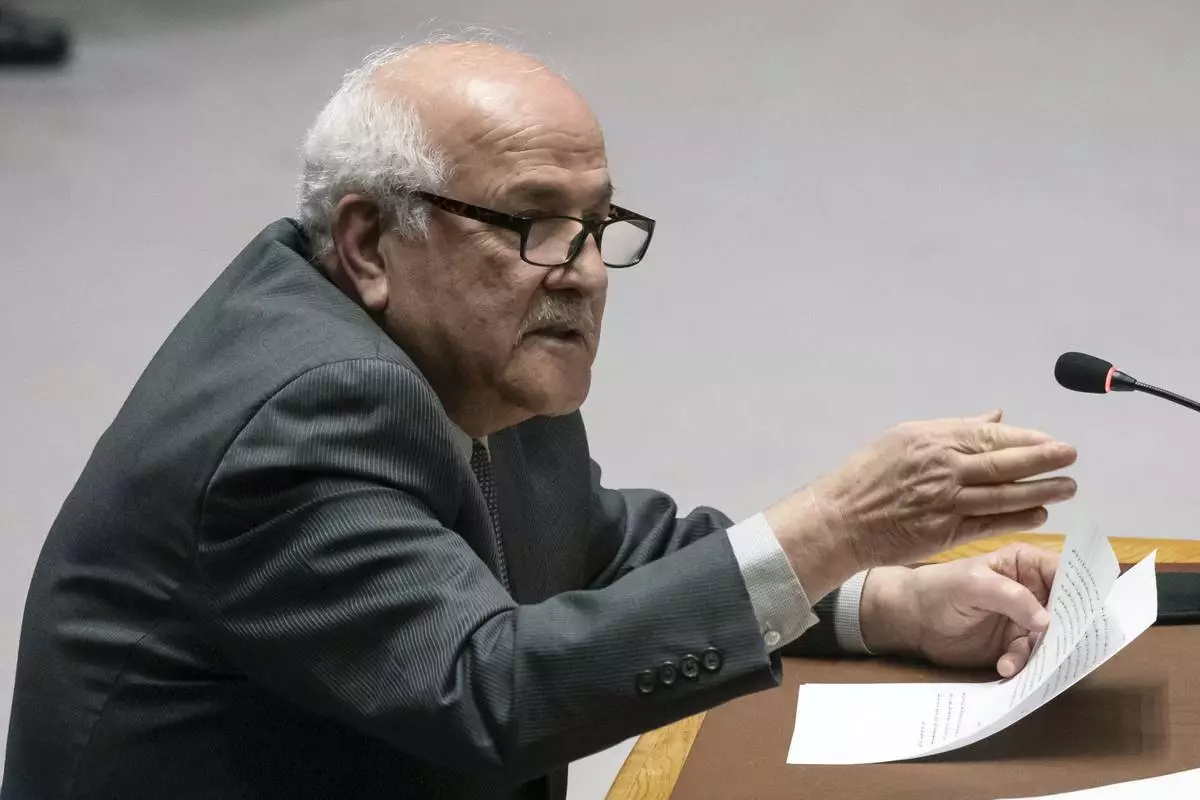
Palestinian Ambassador to the United Nations Riyad Mansour speaks during a Security Council meeting at United Nations headquarters, Thursday, April 18, 2024. (AP Photo/Yuki Iwamura)
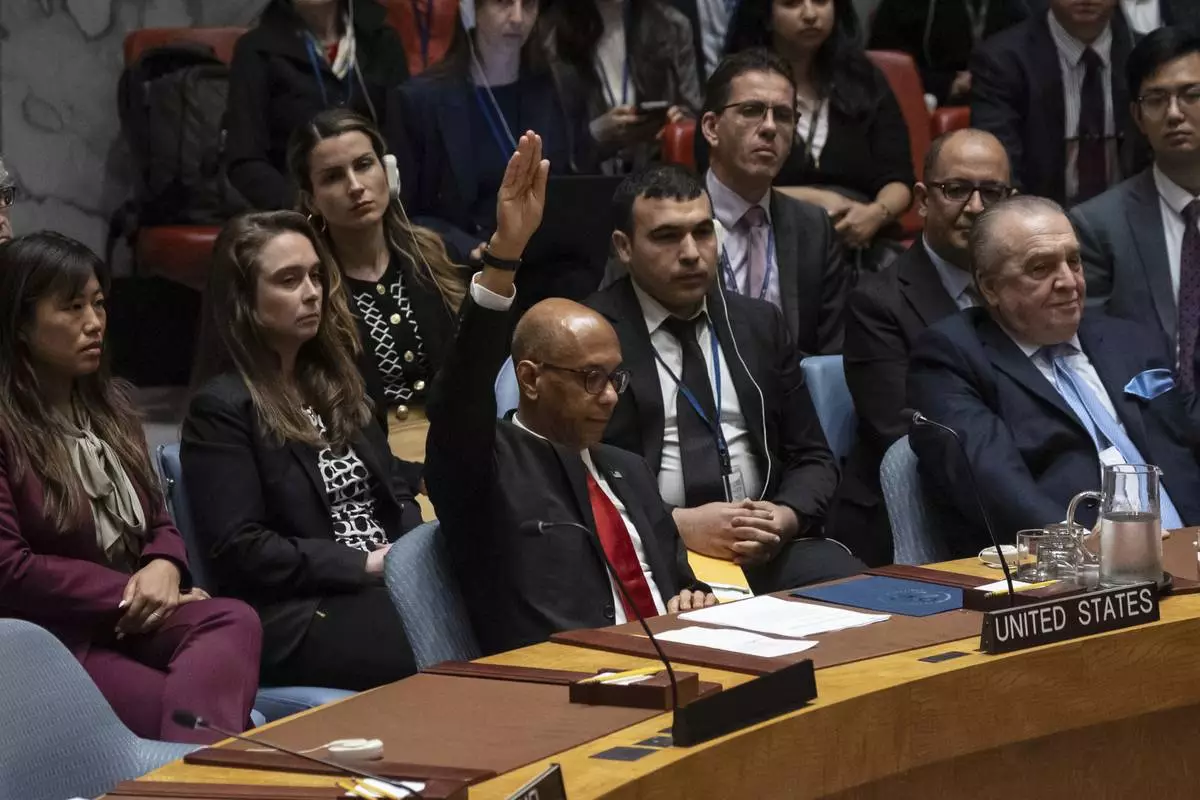
U.S. Deputy Ambassador Robert Wood votes against resolution during a Security Council meeting at United Nations headquarters, Thursday, April 18, 2024. (AP Photo/Yuki Iwamura)





















